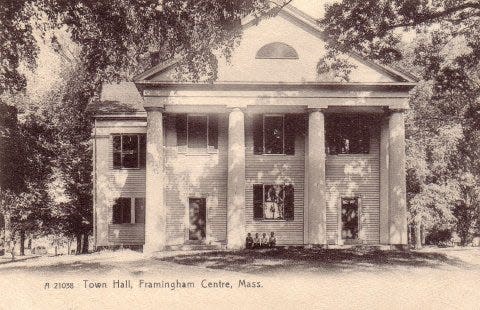Framingham History Center hosts lecture series on pre-Revolutionary War
FRAMINGHAM — Crispus Attucks, a Framingham resident of African American and Native American descent, is generally regarded as the first person killed on the night of the Boston Massacre — March 5, 1770.
As the 250th anniversary of the establishment of the United States approaches, the Grand Lodge of Masons of Massachusetts is holding a Revolution-themed speaker series titled “Boston’s Revolutionary Martyrs," starting Friday and running till Sunday, to highlight the events that led to the Boston Massacre and its aftermath.
Many details of the Boston Massacre remain mysterious. The inaugural lecture aims to answer the unknowns.
Questions that loom large include “Was the Boston Massacre the first fatal violence of the Revolution?" "How do leaders like Dr. Joseph Warren who have been whitewashed from history keep the memory of the Massacre alive?" and "How did this initial massacre shape the ideology of the Martyrdom in American liberty?” The lecture series answers these and other questions.
What really happened?: Framingham History Center exhibit aims to re-contextualize 'Eames Massacre'
The speaker series is a joint effort between the Framingham History Center, Revolution 250, the Dr. Joseph Warren Foundation, the Massachusetts Society of the Sons of the Revolution and the Massachusetts Freemasons. It will feature scholars, historians and authors.

Each event will display artifacts, documents and period pieces that have never been available for public viewing, such as the lost archives of Warren’s medical diary, the only painting of Warren (by John Copley of the Museum of Fine Arts in Boston) and more.
The speaker series aims to allow one to revisit history from a reimagined lens.
Discovering Hidden Gems: Mural created by Framingham kids showcases Black historical contributions
Mr. Know It All: Framingham’s Peter Salem made his mark as a soldier
Who are the speakers?
J.L. Bell, who will discuss Crispus Attucks, maintains the blog Boston1775.net, offering daily posts of history, analysis and unabashed gossip about the era of the American Revolution. Among his scholarly works, he is the author of a book titled "The Road to Concord: How Four Stolen Cannons Ignited the Revolutionary War." He will examine how, through historical artifacts and documents, historians have been able to establish the identity and whereabouts of Attucks.
Q&A: Outgoing Framingham History Center Executive Director Annie Murphy
Katie Turner Getty is an independent researcher and writer focused on the American Revolution in Massachusetts. She serves on the board of the Dr. Joseph Warren Foundation and is a frequent contributor to the "Journal of the American Revolution." She is working on a social history of the Siege of Boston. Her lecture will include the role of men and women in the massacre. According to popular imagination, the massacre serves the white man’s calibre and saviour spirit. However, her research will present how women who have been marginalized for generations were an integral part of the resistance. These are not just white women but, racially and ethnically diverse women who rose up to the challenges of the past.
Christian Di Spigna is the author of "Founding Martyr: The Life and Death of Dr. Joseph Warren, the American Revolution's Lost Hero." He graduated summa cum laude with a degree in history from Columbia University, and is executive director of the Dr. Joseph Warren Foundation. Di Spigna's lecture will discuss how Warren, who should have been one of the Founding Fathers, got lost during historical interpretation and narrativization.
Di Spigna told the Daily News in a phone interview how important Warren’s role was in Americans resisting British forces that had invaded the nation.
The Grand Lodge of Masons
The Grand Lodge of Masons of Massachusetts is the oldest Grand Lodge in the Western Hemisphere and the third-oldest in the world. It was chartered in 1733, following the establishment of the Grand Lodge of England in 1717, and Ireland in 1725. This year marks its 289th anniversary.
Marking history: Here's why the oak tree atop Revolutionary War soldier's grave in Ashland was removed
A Grand Lodge is the governing body of Freemasonry in its jurisdiction.
Freemasons belong to the world's oldest and largest fraternity. It brings together men of every country, religion, race, education, income and opinion and helps develop the bonds of friendship between them.
Through a large variety of North American Masonic philanthropies, about $3 million is given to charity every day, 70% of which benefits the public. During its initiation ceremony, members are encouraged to further develop their character and integrity. By providing meaningful opportunities for fellowship, charity, leadership and education, Freemasonry gives men the opportunity to be the best versions of themselves, and to make their families, workplaces, and communities better.
The first lecture in the series takes place at 7 p.m. Friday at the Framingham History Center, Village Hall on the Common, 2 Oak St. Speaking will be Bell, Getty and DiSpigna.
The event is open to the public. Tickets are $15 and may be purchased by visiting http://framinghamhistory.org/events/bostons-revolutionary-martyrs.
The speaker series continues Saturday at the New England Historic Genealogical Society in Boston (2 p.m.) and Charlestown Historical Society (6 p.m.) and Sunday the Dedham Historical Society & Museum (1 p.m.) and New Bedford Masonic Building (6 p.m.).
This article originally appeared on MetroWest Daily News: Framingham MA hosts speaker series on Revolutionary War
